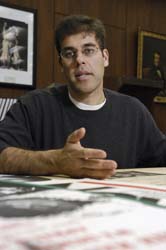UW historian named one of Smithsonian’s top young innovators
Jeremi Suri, a University of Wisconsin–Madison historian whose work is reshaping views of how political power is forged in a globally connected age, has been named one of Smithsonian Magazine’s "37 Under 36: America’s Young Innovators in the Arts and Sciences."

Suri
The first-ever "37 Under 36" honor, detailed in a special issue of Smithsonian on shelves this week, is meant to highlight a new generation of creative thinking among scholars, authors, musicians and scientists. Suri is keeping company with an eclectic crowd, including independent rock musician Sufjan Stevens, del.icio.us social bookmarking mastermind Joshua Schachter, hip-hop educator Marc Bamuthi Joseph (a spring 2007 UW–Madison Interdisciplinary Artist in Residence), and ocean ecologist (and Jacque Cousteau’s grandson) Philippe Cousteau.
The complete Smithsonian profile of Suri is available online.
"I’m flattered that some people think I’m an innovator, because people don’t always think of historians as innovators," Suri says. "But personally, I’ve always been drawn to a history that is creative, and that seems to have something new to say. The great historians to me are not just recounting the past, they have a creative perspective on how history influences the present."
Suri is author of the 2007 biography "Henry Kissinger and the American Century," which received international media attention this summer. Suri’s book differs from most political biographies by its exploration of connections between the personal and the political, showing how Kissinger’s past as a refugee of Nazi Germany and his status as a cultural and social outsider directly shaped his political outlook.
People can register online prior to Oct. 16 for Suri’s unique Web-based course, "The United States and the World: The History of American Foreign Relations since 1941."
Suri also wrote the 2003 book "Power and Protest," which explored the rise of grassroots political movements during the Cold War and their influence on global leaders. Both books, Suri says, reflect core themes of his scholarship: That ordinary citizens have a major influence on the actions of leaders, and that the distinctions between "local" and "international" politics have largely vanished.
"The making of international policy is much more domestically and locally driven than we often assume, and local politics are more internationally influenced than we assume. For too long, we’ve organized our knowledge and our thinking in those terms," says Suri, noting for example that every major newspaper separates its news in local, national and international sections.
One influence is the almost instantaneous flow of information and ideas, and the reduction in barriers to communication between countries and cultures. But Suri also argues that popular activity and opinion across multiple societies matters more than ever to national leaders, because people have the power to mobilize into powerful movements.
"We live in a world where there is less legitimacy to having a few people running things," Suri says. "There’s a constant debate over who has the right to rule, and that leads to less stability and more room for non-traditional influences to come into play."
Suri is working on a new book that will explore the historical tendency of big states to commit themselves to actions in faraway lands that are at high risk for failure, putting the Iraq and Vietnam wars in context with the British Empire-managing of the 19th century and the actions of other major states throughout history. Suri argues that there are forces much larger than the politics of the moment that guide these decisions.
In another innovation for Suri this fall, the history professor will be leading a new online course that takes a thought-provoking look at America’s place in the world.
"The United States and the World: The History of American Foreign Relations since 1941" explores the interactions between states, peoples and cultures. The six-week course, which begins Oct. 23, is offered through a partnership between the Wisconsin Alumni Association (WAA) and UW–Madison’s Division of Continuing Studies. Registration for the course is still available online through Oct. 16.
Tags: faculty awards, history, international




